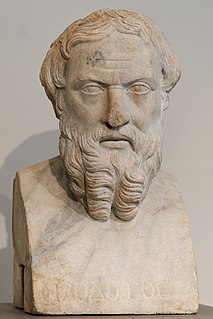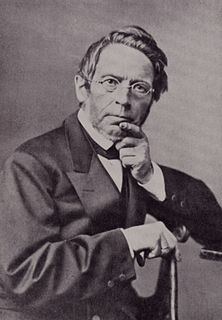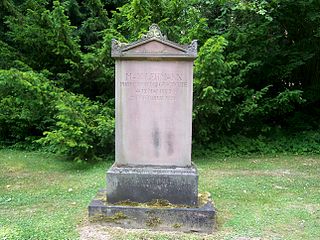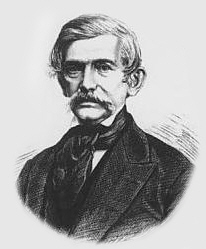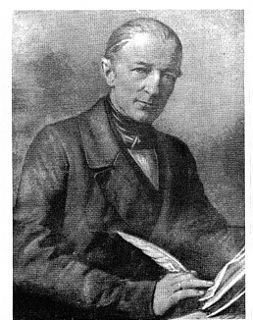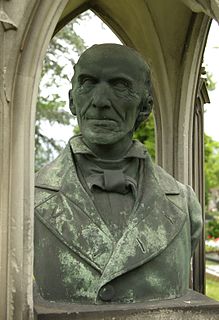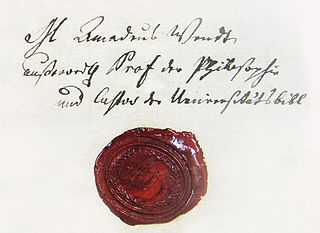Biography
Lamprecht was born in Jessen in the Province of Saxony. As a student, he trained in history, political science, economics, and art at the universities of Göttingen, Leipzig, and Münich. Lamprecht taught at the university in Marburg and later at Leipzig, where he founded a center dedicated to comparative world and cultural history (Institut für Kultur- und Universalgeschichte).

Jessen is a municipality on the Black Elster river and lies in the eastern part of Saxony-Anhalt in the district of Wittenberg.

The Province of Saxony, also known as Prussian Saxony was a province of the Kingdom of Prussia and later the Free State of Prussia from 1816 until 1945. Its capital was Magdeburg.

The University of Göttingen is a public research university in the city of Göttingen, Germany. Founded in 1734 by George II, King of Great Britain and Elector of Hanover, and starting classes in 1737, the Georgia Augusta was conceived to promote the ideals of the Enlightenment. It is the oldest university in the state of Lower Saxony and the largest in student enrollment, which stands at around 31,500.
Lamprecht was employee at the successful edition project “The Chronicles of the German Cities” under the leadership of the well-known and highly reputated German historian Karl von Hegel. [1]
Friedrich Wilhelm Karl, Ritter von Hegel was a German historian. During his lifetime he was a well-known and well-reputed historian who received many awards and honours, because he was one of the major urban historians during the second half of the 19th century.
Lamprecht studied German and European social and economic history, particularly of the Middle Ages. He aroused considerable controversy with his loose interdisciplinary methods and focus on broad social, environmental, and even psychological, questions in history. To him, history meant as much the revelation of sociology as of political events.

In the history of Europe, the Middle Ages lasted from the 5th to the 15th century. It began with the fall of the Western Roman Empire and merged into the Renaissance and the Age of Discovery. The Middle Ages is the middle period of the three traditional divisions of Western history: classical antiquity, the medieval period, and the modern period. The medieval period is itself subdivided into the Early, High, and Late Middle Ages.
Lamprecht's ambitious Deutsche Geschichte (13 vols., 1891-1908) on the whole trajectory of German history sparked a famous Methodenstreit (methodological dispute) within Germany's academic history establishment, especially Max Weber, who habitually referred to Lamprecht as a mere dilettante. Lamprecht came under criticism from scholars of legal and constitutional history like Friedrich Meinecke and Georg von Below for his lack of methodological rigor and inattention to important political trends and ideologies. As a result, Lamprecht and his students were marginalized by German academia, and interdisciplinary social history remained something of a taboo among German historians for much of the twentieth century. However, during the years of the series' publication, his work enjoyed a wide readership among the nonacademic German community.
Methodenstreit, in intellectual history beyond German-language discourse, was an economics controversy commenced in the 1880s and persisting for more than a decade, between that field's Austrian School and the (German) Historical School. The debate concerned the place of general theory in social science and the use of history in explaining the dynamics of human action. It also touched on policy and political issues, including the roles of the individual and state. Nevertheless, methodological concerns were uppermost and some early members of the Austrian School also defended a form of welfare state, as prominently advocated by the Historical School.

Maximilian Karl Emil Weber was a German sociologist, philosopher, jurist, and political economist. His ideas profoundly influenced social theory and social research. Weber is often cited, with Émile Durkheim and Karl Marx, as among the three founders of sociology. Weber was a key proponent of methodological anti-positivism, arguing for the study of social action through interpretive means, based on understanding the purpose and meaning that individuals attach to their own actions. Unlike Durkheim, he did not believe in mono-causality and rather proposed that for any outcome there can be multiple causes.
Friedrich Meinecke was a German historian, with national liberal and anti-semitic views, who supported the Nazi invasion of Poland. After World War II, as a representative of an older tradition, he criticized the Nazi regime, but continued to express anti-semitic prejudice.
He was the chief exponent of the Kulturgeschichte (“History of Culture”), and believed intensely in the superiority of German culture. Shortly before his death he repudiated, with some indignation, the conception of Germany's part in World War I as having been dictated by “war lords,” and avowed that in regard to it that Germany was united.

World War I, also known as the First World War or the Great War, was a global war originating in Europe that lasted from 28 July 1914 to 11 November 1918. Contemporaneously described as "the war to end all wars", it led to the mobilisation of more than 70 million military personnel, including 60 million Europeans, making it one of the largest wars in history. It is also one of the deadliest conflicts in history, with an estimated nine million combatants and seven million civilian deaths as a direct result of the war, while resulting genocides and the 1918 influenza pandemic caused another 50 to 100 million deaths worldwide.
Lamprecht died in Leipzig on 10 May 1915 from what appears to have been the result of internal bleeding brought on by a perforated ulcer.
Influence
According to Ernst Breisach,
- Lamprecht himself stipulated psychological forces as the basic forces in all of history. But they derived from the collective psyche of every nation and not from the idiosyncratic forces of individual psyches.Historiography p. 279
Lamprecht found a much more positive reception for his ideas and methods in France and the United States. In 1904, he was invited to give a series of lectures at Columbia University, which were translated and published in 1905 as What is History?
- Lamprecht failed to convince other historians, but a mutant of the idea of a Volksseele intruded into French historiography as the concept of a period's mentality, especially as mentalité or sensibilité in Febvre's work. Breisach p.342-3
Lamprecht's work was a formative influence in the thinking of the French social historian Marc Bloch as well the Annales School. One of his students was Cai Yuanpei, who later served as the chancellor of Beijing University and had an enormous influence on modern Chinese thought.
This page is based on this
Wikipedia article Text is available under the
CC BY-SA 4.0 license; additional terms may apply.
Images, videos and audio are available under their respective licenses.


